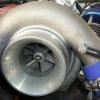Should I Get A Pfc Help Me Make Up My Mind!
Announcements
-
Similar Content
-
Latest Posts
-
I neglected to respond to this previously. Get it up to 100 psi, and then you'll be OK.
-
I agree with everything else, except (and I'm rethinking this as it wasn't setup how my brain first though) if the sensor is at the end of a hose which is how it has been recommended to isolate it from vibrations, then if that line had a small hole in, I could foresee potentially (not a fluid dynamic specialist) the ability for it to see a lower pressure at the sensor. But thinking through, said sensor was in the actual block, HOWEVER it was also the sensor itself that broke, so oil pressure may not have been fully reaching the sensor still. So I'm still in my same theory. However, I 100% would be saying COOL THE OIL DOWN if it's at 125c. That would be an epic concern of mine. Im now thinking as you did Brad that the knock detection is likely due to the bearings giving a bit more noise as pressure dropped away. Kinkstah, drop your oil, and get a sample of it (as you're draining it) and send it off for analysis.
-
I myself AM TOTALLY UNPREPARED TO BELIEVE that the load is higher on the track than on the dyno. If it is not happening on the dyno, I cannot see it happening on the track. The difference you are seeing is because it is hot on the track, and I am pretty sure your tuner is not belting the crap out of it on teh dyno when it starts to get hot. The only way that being hot on the track can lead to real ping, that I can think of, is if you are getting more oil (from mist in the inlet tract, or going up past the oil control rings) reducing the effective octane rating of the fuel and causing ping that way. Yeah, nah. Look at this graph which I will helpfully show you zoomed back in. As an engineer, I look at the difference in viscocity at (in your case, 125°C) and say "they're all the same number". Even though those lines are not completely collapsed down onto each other, the oil grades you are talking about (40, 50 and 60) are teh top three lines (150, 220 and 320) and as far as I am concerned, there is not enough difference between them at that temperature to be meaningful. The viscosity of 60 at 125°C is teh same as 40 at 100°C. You should not operate it under high load at high temperature. That is purely because the only way they can achieve their emissions numbers is with thin-arse oil in it, so they have to tell you to put thin oil in it for the street. They know that no-one can drive the car & engine hard enough on the street to reach the operating regime that demands the actual correct oil that the engine needs on the track. And so they tell you to put that oil in for the track. Find a way to get more air into it, or, more likely, out of it. Or add a water spray for when it's hot. Or something. As to the leak --- a small leak that cannot cause near catastrophic volume loss in a few seconds cannot cause a low pressure condition in the engine. If the leak is large enough to drop oil pressure, then you will only get one or two shots at it before the sump is drained.
-
So..... it's going to be a heater hose or other coolant hose at the rear of the head/plenum. Or it's going to be one of the welch plugs on the back of the motor, which is a motor out thing to fix.
-
The oil pressure sensor for logging, does it happen to be the one that was slowly breaking out of the oil block? If it is,I would be ignoring your logs. You had a leak at the sensor which would mean it can't read accurately. It's a small hole at the sensor, and you had a small hole just before it, meaning you could have lost significant pressure reading. As for brakes, if it's just fluid getting old, you won't necessarily end up with air sitting in the line. Bleed a shit tonne of fluid through so you effectively replace it and go again. Oh and, pay close attention to the pressure gauge while on track!
-




Recommended Posts
Create an account or sign in to comment
You need to be a member in order to leave a comment
Create an account
Sign up for a new account in our community. It's easy!
Register a new accountSign in
Already have an account? Sign in here.
Sign In Now